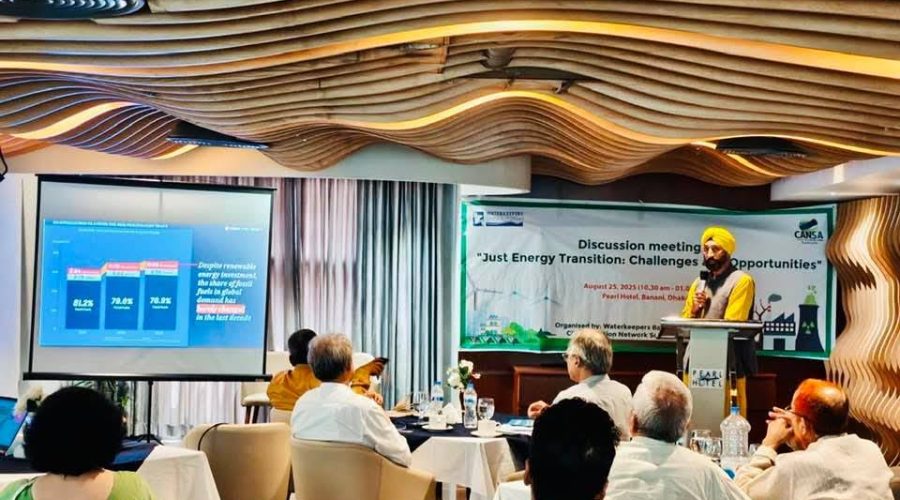Discussion on “Just Energy Transition: Challenges and Opportunities” - WATERKEEPERS BANGLADESH
- Activities
- Discussion on “Just Energy Transition: Challenges and Opportunities”
- August 25, 2025
- 2nd admin
At this critical juncture of global climate change, it is essential to bring about a revolutionary change in the energy industry. Fossil fuels are spreading greenhouse gases around the world, which is causing the world’s environment to deteriorate day by day, and as a result, the level of socio-economic inequality is also increasing. In this context, a just energy transition is not only an alternative strategy for renewable energy sources, but also a fair, inclusive, and sustainable development. The issue of a just transition is very necessary for a country like Bangladesh. Bangladesh’s economy is expanding rapidly due to the increase in energy demand, which has placed Bangladesh in a very important position in the global energy expansion and fair-trade considerations. The country is now vulnerable to both economic uncertainty and energy insecurity due to its heavy reliance on fossil fuels, such as coal, oil, and liquefied gas imports. Despite extensive efforts to promote the use of renewable energy, its contribution to the country’s total energy consumption is still small. The Bangladesh government has recently taken the initiative to formulate a Renewable Energy Policy 2025. This policy sets new targets, although there are inconsistencies in renewable energy targets with other plans and policies. Therefore, it is time to deeply review the challenges and opportunities for a just energy transition in Bangladesh.
Considering the above issues, Waterkeepers Bangladesh and Climate Action Network Asia (CANSA) jointly organized a discussion meeting on August 25, 2025, at Hotel Pearl, Banani, Dhaka. The keynote address at the meeting was delivered by Harjit Singh, Strategic Advisor, to the Fossil Fuel Non-Proliferation Treaty Initiative. Among others who participated in the meeting as discussants were Badrul Imam, Honorable Professor of the Department of Geology, University of Dhaka, Md. Ziaul Haque, Director, Department of Environment (DoE), Government of the People’s Republic of Bangladesh, Shahriar Ahmed Chowdhury, Chairman of the Center for Renewable Energy Services Limited, Shibayan Raha, Asia Campaigner of the Fossil Fuel Non-Proliferation Treaty Initiative, Banasree Mitra Niyogi, Director of the Rights and Good Governance Program of the Manusher Jonno Foundation, Director of the Center for Atmospheric Pollution Studies (CAPS) Professor Dr. Ahmed Kamruzzaman Majumder, Chief Analyst of the Institute for Energy Economics and Financial Analysis (IEEFA) Shafiqul Alam, Amanullah Parag, South Asia Coordinator of 350.org (threefifty.org). Sharif Jamil, Central Member Secretary of Dhoritri Rokhhay Amra (DHORA) and Coordinator of Waterkeepers Bangladesh, moderated the program and explained the background. M. S. Siddiqui, Co-Convenor of Dhoritri Rokhhay Amra (DHORA) delivered the closing remarks.
Sharif Jamil, Central Member Secretary of Dhoritri Rokhhay Amra (DHORA) and Coordinator of Waterkeepers Bangladesh said that the previous government’s activities have created capacity in the power sector but also created problems. Due to coal-based power projects, there has been damage to agricultural land, public health, salt cultivation, livelihoods, etc. We needed to conduct a proper environmental survey.
Harjit Singh, Strategic Advisor to the Fossil Fuel Non-Proliferation Treaty Initiative, said that other countries have learned from Bangladesh how to move forward in renewable energy. We are very worried about the 1.6 degree increase in global temperature. We are facing new pressures. If we are not aware, more problems will arise. We are still dependent on fossil fuels. The silent trade war and other obstacles are creating complications in our path forward, which requires international cooperation. Many countries have the capacity but are reluctant to take responsibility because they have to provide the money. Fossil fuels are not mentioned once in the Paris Agreement. He introduced the countries participating in the Fossil Fuel Non-Proliferation Treaty.
Banasree Mitra Niyogi, Director of the Rights and Good Governance Program at the Manusher Jonno Foundation said, questions related to fair energy are never asked to marginalized communities. We need to think about these communities as well.
Newslinks:










